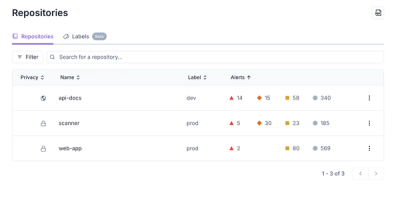
Product
Redesigned Repositories Page: A Faster Way to Prioritize Security Risk
Our redesigned Repositories page adds alert severity, filtering, and tabs for faster triage and clearer insights across all your projects.
@smithy/fetch-http-handler
Advanced tools
@smithy/fetch-http-handler is a package that provides an HTTP handler for making requests using the Fetch API. It is part of the AWS SDK for JavaScript v3 and is designed to work seamlessly with other Smithy components to handle HTTP requests and responses.
Basic HTTP Request
This feature allows you to make a basic HTTP GET request using the FetchHttpHandler. The request object specifies the method, hostname, and path for the request.
const { FetchHttpHandler } = require('@smithy/fetch-http-handler');
const handler = new FetchHttpHandler();
const request = {
method: 'GET',
hostname: 'example.com',
path: '/path'
};
handler.handle(request).then(response => {
console.log(response);
}).catch(error => {
console.error(error);
});Custom HTTP Headers
This feature allows you to add custom HTTP headers to your request. The headers object within the request object specifies the custom headers.
const { FetchHttpHandler } = require('@smithy/fetch-http-handler');
const handler = new FetchHttpHandler();
const request = {
method: 'GET',
hostname: 'example.com',
path: '/path',
headers: {
'Custom-Header': 'value'
}
};
handler.handle(request).then(response => {
console.log(response);
}).catch(error => {
console.error(error);
});Handling HTTP Responses
This feature demonstrates how to handle HTTP responses. The response object contains the body, which can be processed further, such as converting it to text.
const { FetchHttpHandler } = require('@smithy/fetch-http-handler');
const handler = new FetchHttpHandler();
const request = {
method: 'GET',
hostname: 'example.com',
path: '/path'
};
handler.handle(request).then(response => {
return response.body.text();
}).then(body => {
console.log(body);
}).catch(error => {
console.error(error);
});Axios is a popular promise-based HTTP client for the browser and Node.js. It provides a simple API for making HTTP requests and handling responses. Compared to @smithy/fetch-http-handler, Axios offers more features out of the box, such as request and response interceptors, automatic JSON data transformation, and support for older browsers.
Node-fetch is a lightweight module that brings the Fetch API to Node.js. It is similar to @smithy/fetch-http-handler in that it uses the Fetch API for making HTTP requests. However, node-fetch is more focused on providing a minimal implementation of the Fetch API for Node.js environments, whereas @smithy/fetch-http-handler is designed to integrate with the AWS SDK for JavaScript v3.
Got is a human-friendly and powerful HTTP request library for Node.js. It supports promises, streams, retries, and many other features. Compared to @smithy/fetch-http-handler, Got offers a more extensive set of features and a more user-friendly API for making HTTP requests and handling responses.
FAQs
Provides a way to make requests
The npm package @smithy/fetch-http-handler receives a total of 26,791,760 weekly downloads. As such, @smithy/fetch-http-handler popularity was classified as popular.
We found that @smithy/fetch-http-handler demonstrated a healthy version release cadence and project activity because the last version was released less than a year ago. It has 3 open source maintainers collaborating on the project.
Did you know?

Socket for GitHub automatically highlights issues in each pull request and monitors the health of all your open source dependencies. Discover the contents of your packages and block harmful activity before you install or update your dependencies.

Product
Our redesigned Repositories page adds alert severity, filtering, and tabs for faster triage and clearer insights across all your projects.

Security News
Multiple deserialization flaws in PyTorch Lightning could allow remote code execution when loading untrusted model files, affecting versions up to 2.4.0.

Security News
NVD now marks all pre-2018 CVEs as "Deferred," signaling it will no longer enrich older vulnerabilities, further eroding trust in its data.